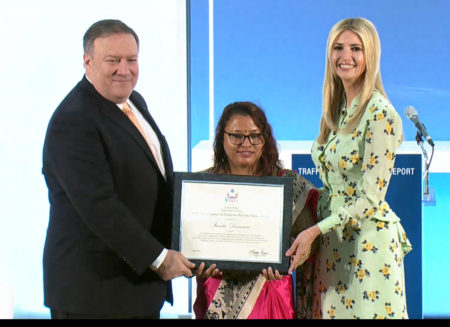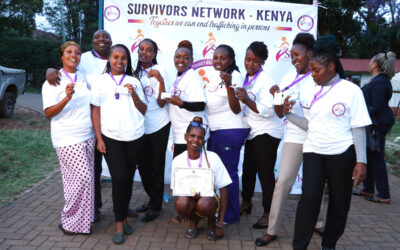The U.S. State Department says many African governments are doing a better job combating modern slavery. More than a dozen African nations received upgrades in the annual Trafficking in Persons Report (TIP).
The upgrades include Ghana, where Free the Slaves has helped lead a comprehensive program to strengthen communities and government agencies.
“We saw some positive movements across entire regions,” said U.S. Secretary of State Mike Pompeo while releasing the report in Washington Thursday. “Of the 48 African countries included in the report, 14 received upgrades, meaning we observed a strong trend of increased efforts to improve their overall response. Despite significant security threats, migration challenges, financial constraints and other obstacles, the region improved significantly. We commend those countries taking action.”
Free the Slaves operates field programs in Ghana, Senegal and the Democratic Republic of the Congo. Ghana was upgraded to “Tier 2” in the report, meaning its government does not fully meet U.S. standards to eliminate human trafficking but is making significant efforts to come into compliance. Senegal remained on the Tier 2 Watch List – putting its government on notice that it must work harder or be downgraded in future reports. The Congo remains on Tier 3, indicating its government does not meet minimum standards to fight modern slavery and is not making significant efforts to do so.
Tier rankings for other countries where Free the Slaves currently works: India (Tier 2), Nepal (Tier 2), Dominican Republic (Tier 2), Haiti (Tier 3). See the full report here.
The co-founder of our former Nepal partner organization Shakti Samuha received a special award at the TIP Report event as one of this year’s ten TIP heroes. Slavery survivor Sunita Danuwar’s certificate was presented by Secretary Pompeo and presidential adviser Ivanka Trump.

Secretary Pompeo noted at the event that there is widespread support for anti-slavery efforts.
“We know that putting an end to human trafficking is a bipartisan objective,” he said. “It supersedes any politics here in the United States. Our commitment to fighting and ending this together is incredibly strong.”
The acting head of the State Department’s Trafficking in Persons Office, Kari Johnstone, noted that “individuals make the difference.” She said that “some of the most innovative ideas come from the grassroots.”
Their comments underscored the rerport’s underlying theme: empowering communities.
“If we’re going to win this fight, national governments must empower local communities to proactively identify human trafficking and develop local solutions to address it,” Pompeo said.
The Alliance to End Slavery and Trafficking (ATEST), which includes Free the Slaves, noted on the occasion of the report’s release that it underscores the need for action by Congress to support America’s anti-trafficking programs.
“America’s key anti-trafficking law, the Trafficking Victims Protection Act, which provides the architecture for America’s federal trafficking response, has lapsed and its renewal is pending as part of a package of anti-trafficking measures before Congress. On this day of the annual TIP Report release, we urge Congress to approve this comprehensive legislation without delay,” the statement said. “This federal assessment [also] underscores the need for robust U.S. funding for anti-trafficking programs both at home and abroad. ATEST has urged Congress to hold the line in FY 2019 deliberations, with no decreases in U.S. funded programs that address human trafficking and its root causes.” See the full statement here.



